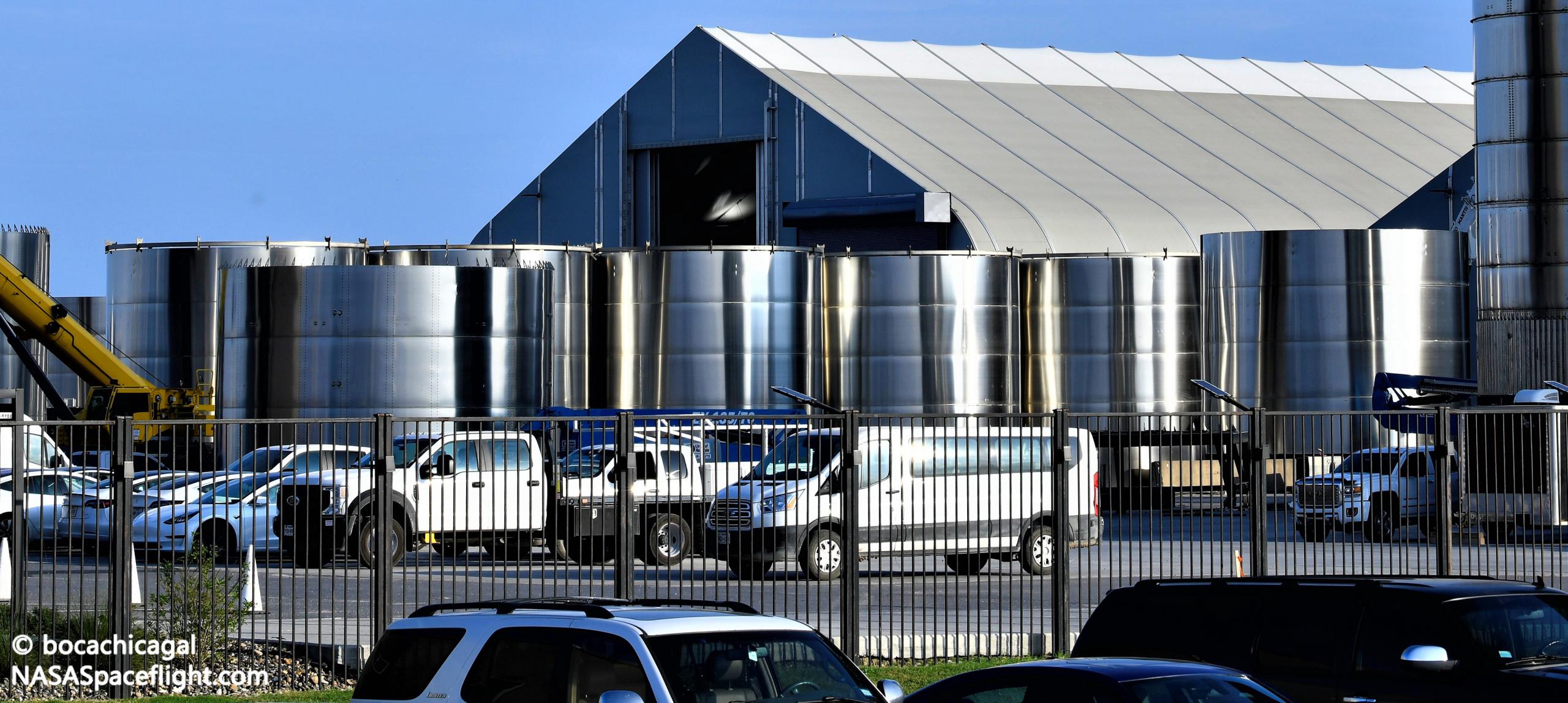
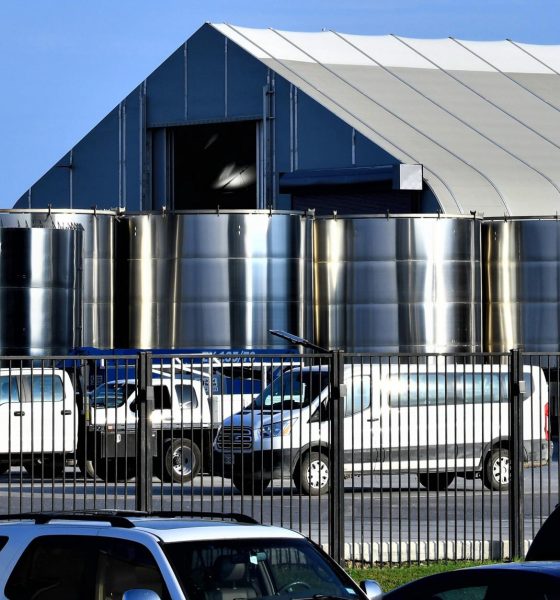
News
SpaceX Starbase construction takes priority as next orbital Starship, Super Heavy pair come together
As SpaceX teams slowly prepare the first orbital-class Starship and Super Heavy booster for the next-generation rocket’s first full-stack launch, the company has simultaneously begun assembling a second ship/booster pair. However, it’s clear that orbital pad construction remains a priority.
Known as Ship 20 and Booster 4, the two stages of the first orbital-class Starship first arrived at the launch site in early August. Only eight weeks later has Starship S20 finally become the first of the pair to attempt and complete one of two crucial proof tests, opening the door for one or several Raptor static fires in the coming week or two. Meanwhile, Booster 4 has had all 29 of its Raptor engines installed, uninstalled, and reinstalled and twice been placed on and removed from Starbase’s orbital launch mount in the same time frame but has yet to attempt any proof testing.
Despite the apparent delays and challenges slowing Ship 20 and Booster 4’s test debuts and two plodding FAA reviews that appear all but guaranteed to preclude an orbital launch attempt in 2021, though, SpaceX has recently begun assembling a second two-stage Starship.
Save for Starhopper back in 2019, no Starship or Super Heavy prototype has spent nearly as long at the launch site without a single test as Ship 20 and Booster 4 have. To an extent, there have likely been some technical delays while assembling, outfitting, and working with two first-of-their-kind prototypes. Still, the difference between past vehicles like Starship SN15 and Super Heavy Booster 3 are so stark that some portion of the testing delays almost has to be a conscious decision made by SpaceX.
To be able to fully proof and static fire test Super Heavy B4, SpaceX first needs to plumb, wire, and outfit Starbase’s orbital launch mount and complete a majority of the orbital pad’s massive tank farm. However, the orbital pad and its many unfinished systems are situated just a thousand (~300m) east of the suborbital launch site and Starship test facilities, which are complete and ready for testing. To test a Starship at those facilities, SpaceX has to entirely clear the pad of personnel – now several hundred people at the peak of construction – for 6-12+ hours.
The implication is that SpaceX management effectively chose to rip off the bandage now rather than later, sacrificing timely testing of Starship S20 to allow a near-total focus on orbital pad construction and activation over the last ~8 weeks. It’s hard to say if that’s paid off but the fact that SpaceX has chosen this particular moment to begin assembling the next orbital-class Starship and Super Heavy suggests that a clearer plan is starting to come together.
B4/S20, meet B5/S21
Parts of Starship S21 and Super Heavy B5 have been floating around Starbase’s build site for weeks. There was a multi-week period, for example, where the site’s massive high bay was effectively unused – clearly a conscious choice given SpaceX’s history of Starship prototype production earlier this year and late last. Parts of Super Heavy B5 were likely ready for assembly (i.e. stacking) by mid to late August. The ‘mid bay’ used for Starship tank section assembly has been similarly underutilized for even longer – only recently accepting its first Starship S21 section after supporting assembly of the orbital pad’s final storage tank.
Instead, Booster 5 stacking began around September 15th. At the current rate of assembly, which has slowed down considerably in the last week, SpaceX’s second flightworthy Super Heavy could reach its full 69m (~225 ft) height as early as mid-October. Starship S20 likely won’t be far behind. Further, thanks to SpaceX’s preferred style of continuous improvement, Booster 5 and Ship 21 production already appear well on track to outpace Booster 4 and Ship 20. With B5, rather than installing a range of external equipment (avionics, wiring, plumbing) after assembly is finished, SpaceX appears to be completing some of those subsystems during stacking, potentially speeding up final assembly by 1-2+ weeks. With S21, SpaceX has begun outfitting the Starship’s nose cone with heat shield tiles far earlier in the assembly process than it did with S20.
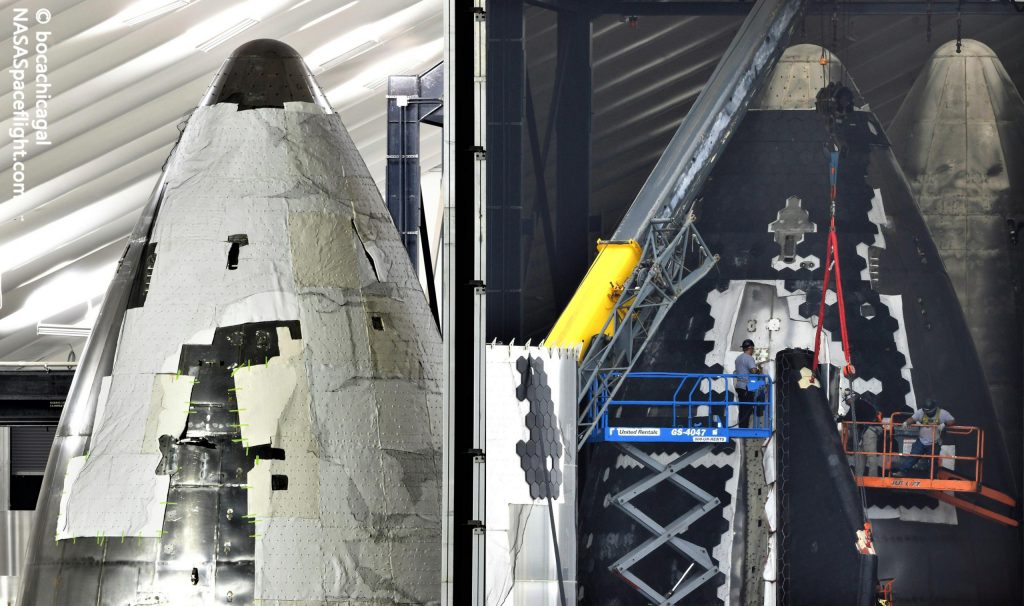
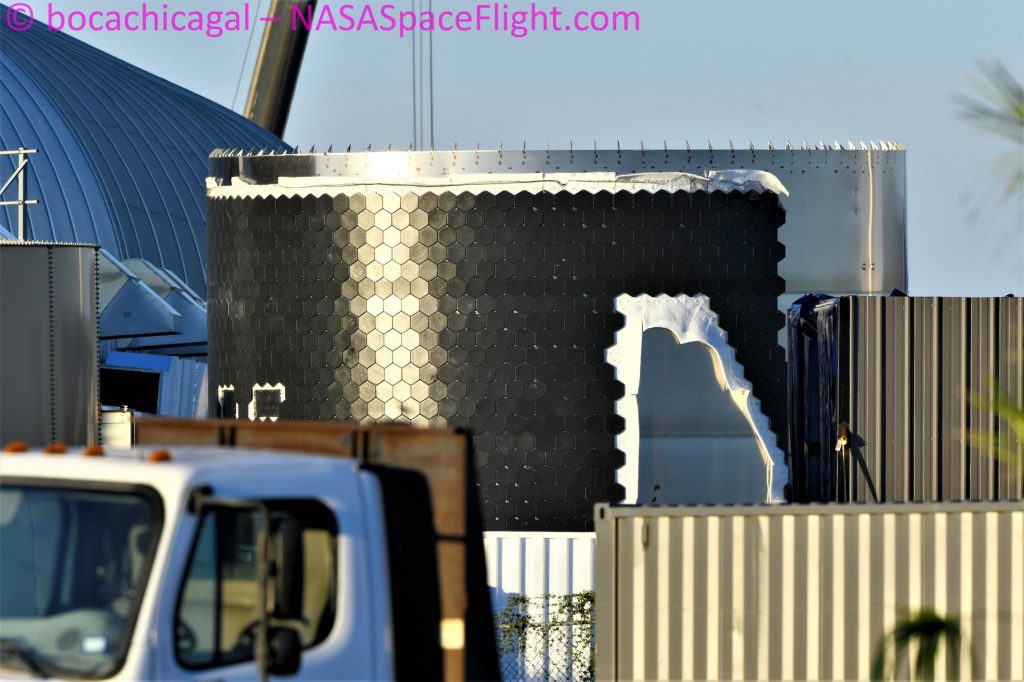
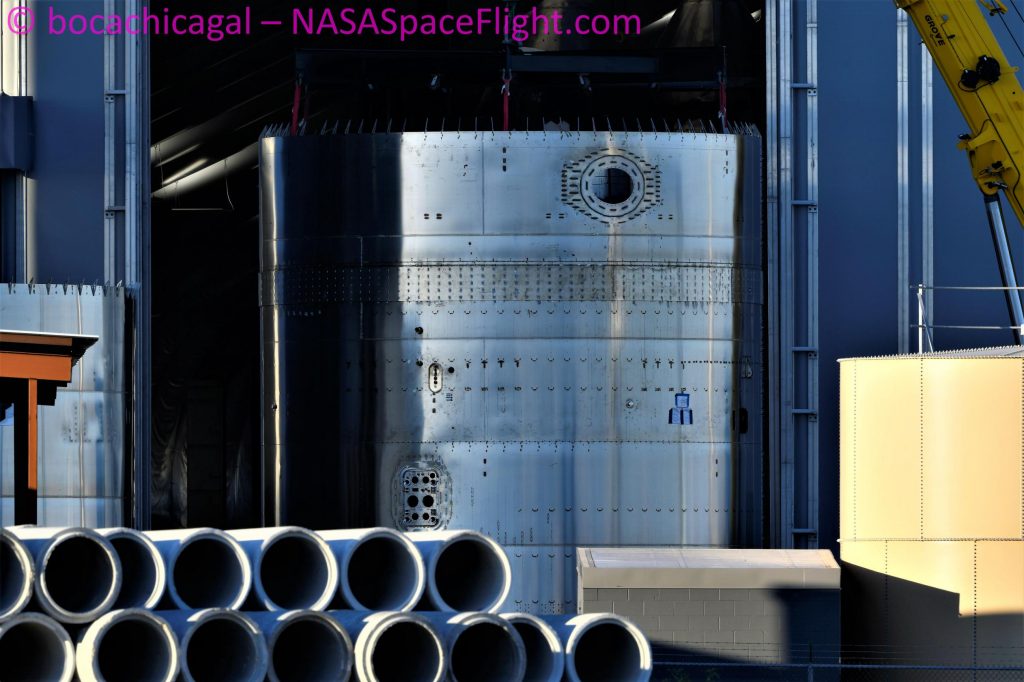
Given that it has taken SpaceX the better part of a month to finish and spot-fix Starship S20’s heat shield since the prototype’s second trip to the test site, taking those lessons learned to heart and getting Starship S21’s heat shield installation right on the first try could cut weeks from final assembly.
In the meantime, after completing Ship 20’s first cryoproof test on September 29th, SpaceX will hopefully be able to kick off the first six-engine Raptor static fire test campaign within the next week or so. With any luck, the start of B5/S21 assembly also means that the orbital launch pad is nearly ready to support Super Heavy B4’s first proof tests, even if static fires with anything close to a full set of 29 Raptors appear to be weeks away. Regardless, it looks like it won’t be long before SpaceX will be juggling two pairs of orbital-class Starships and Super Heavy boosters.

News
Tesla ships out update that brings massive change to two big features
“This change only updates the name of certain features and text in your vehicle,” the company wrote in Release Notes for the update, “and does not change the way your features behave.”

Tesla has shipped out an update for its vehicles that was caused specifically by a California lawsuit that threatened the company’s ability to sell cars because of how it named its driver assistance suite.
Tesla shipped out Software Update 2026.2.9 starting last week; we received it already, and it only brings a few minor changes, mostly related to how things are referenced.
“This change only updates the name of certain features and text in your vehicle,” the company wrote in Release Notes for the update, “and does not change the way your features behave.”
The following changes came to Tesla vehicles in the update:
- Navigate on Autopilot has now been renamed to Navigate on Autosteer
- FSD Computer has been renamed to AI Computer
Tesla faced a 30-day sales suspension in California after the state’s Department of Motor Vehicles stated the company had to come into compliance regarding the marketing of its automated driving features.
The agency confirmed on February 18 that it had taken a “corrective action” to resolve the issue. That corrective action was renaming certain parts of its ADAS.
Tesla discontinued its standalone Autopilot offering in January and ramped up the marketing of Full Self-Driving Supervised. Tesla had said on X that the issue with naming “was a ‘consumer protection’ order about the use of the term ‘Autopilot’ in a case where not one single customer came forward to say there’s a problem.”
This was a “consumer protection” order about the use of the term “Autopilot” in a case where not one single customer came forward to say there’s a problem.
Sales in California will continue uninterrupted.
— Tesla North America (@tesla_na) December 17, 2025
It is now compliant with the wishes of the California DMV, and we’re all dealing with it now.
This was the first primary dispute over the terminology of Full Self-Driving, but it has undergone some scrutiny at the federal level, as some government officials have claimed the suite has “deceptive” names. Previous Transportation Secretary Pete Buttigieg was one of those federal-level employees who had an issue with the names “Autopilot” and “Full Self-Driving.”
Tesla sued the California DMV over the ruling last week.
News
Tesla workers push back against Giga Berlin unionization
“IG Metall did not succeed in Giga Berlin‘s works council election earlier today. The union share was reduced from nearly 40% in 2024 to 31% in 2026! This is a clear message by the Giga Berlin team towards an independent co-determination! The list called Giga United, led by the current chairwoman, Michaela Schmitz, received the most votes with more than 40%! Good news for Giga Berlin!”

Tesla workers pushed back against unionization efforts at Gigafactory Berlin, and over the past few years, there has been a dramatic decrease in interest to unionize at the German plant.
Gigafactory Berlin Plant Manager André Thierig announced on Wednesday that IG Metall, the European union group, saw its share reduce from 40 to 31 percent in 2026 as employees eligible to vote on the issue. Instead, the Giga Berlin team, known as Giga United, received the most votes with more than 40 percent.
BREAKING! 🚨
IG Metall did not succeed in Giga Berlin‘s works council election earlier today. The union share was reduced from nearly 40% in 2024 to 31% in 2026!
This is a clear message by theGiga Berlin team towards an independent co-determination!
The list called Giga…
— André Thierig (@AndrThie) March 4, 2026
Thierig gave specific details in a post on X:
“IG Metall did not succeed in Giga Berlin‘s works council election earlier today. The union share was reduced from nearly 40% in 2024 to 31% in 2026! This is a clear message by the Giga Berlin team towards an independent co-determination! The list called Giga United, led by the current chairwoman, Michaela Schmitz, received the most votes with more than 40%! Good news for Giga Berlin!”
There were over 10,700 total employees who were eligible to vote, with 87 percent of them turning out to cast what they wanted. There were three key outcomes: Giga United, IG Metall, and other notable groups, with the most popular being the Polish Initiative.
The 37-seat council remains dominated by non-unionized representatives, preserving Giga Berlin as Germany’s only major auto plant without a collective bargaining agreement.
Thierig and Tesla framed the outcome as employee support for an “independent, flexible, and unbureaucratic” future, enabling acceleration on projects like potential expansions or new models. IG Metall expressed disappointment, accusing management of intimidation tactics and an “unfair” campaign.
The first election of this nature happened back in 2022. In 2024, IG Metall emerged as the largest single faction with 39.4 percent, but non-union lists coalesced for a majority.
But this year was different. There was some extra tension at Giga Berlin this year, as just two weeks ago, an IG Metall rep was accused by Tesla of secretly recording a council meeting. The group countersued for defamation.
Tesla Giga Berlin plant manager faces defamation probe after IG Metall union complaint
This result from the 2026 vote reinforced Tesla’s model of direct employee-management alignment over traditional German union structures, amid ongoing debates about working conditions. IG Metall views it as a setback but continues advocacy. Tesla sees it as validation of its approach in a competitive EV market.
This outcome may influence future labor dynamics at Giga Berlin, including any revival of expansion plans or product lines, which Musk has talked about recently.
News
SpaceX President Gwynne Shotwell details xAI power pledge at White House event
The commitment was announced during an event with United States President Donald Trump.

SpaceX President Gwynne Shotwell stated that xAI will develop 1.2 gigawatts of power at its Memphis-area AI supercomputer site as part of the White House’s new “Ratepayer Protection Pledge.”
The commitment was announced during an event with United States President Donald Trump.
During the White House event, Shotwell stated that xAI’s AI data center near Memphis would include a major energy installation designed to support the facility’s power needs.
“As you know, xAI builds huge supercomputers and data centers and we build them fast. Currently, we’re building one on the Tennessee-Mississippi state line. As part of today’s commitment, we will take extensive additional steps to continue to reduce the costs of electricity for our neighbors…
“xAI will therefore commit to develop 1.2 GW of power as our supercomputer’s primary power source. That will be for every additional data center as well. We will expand what is already the largest global Megapack power installation in the world,” Shotwell said.
She added that the system would provide significant backup power capacity.
“The installation will provide enough backup power to power the city of Memphis, and more than sufficient energy to power the town of Southaven, Mississippi where the data center resides. We will build new substations and invest in electrical infrastructure to provide stability to the area’s grid.”
Shotwell also noted that xAI will be supporting the area’s water supply as well.
“We haven’t talked about it yet, but this is actually quite important. We will build state-of-the-art water recycling plants that will protect approximately 4.7 billion gallons of water from the Memphis aquifer each year. And we will employ thousands of American workers from around the city of Memphis on both sides of the TN-MS border,” she noted.
The Ratepayer Protection Pledge was introduced as part of the federal government’s effort to address concerns about rising electricity costs tied to large AI data centers, as noted in an Insider report. Under the agreement, companies developing major AI infrastructure projects committed to covering their own power generation needs and avoiding additional costs for local ratepayers.








